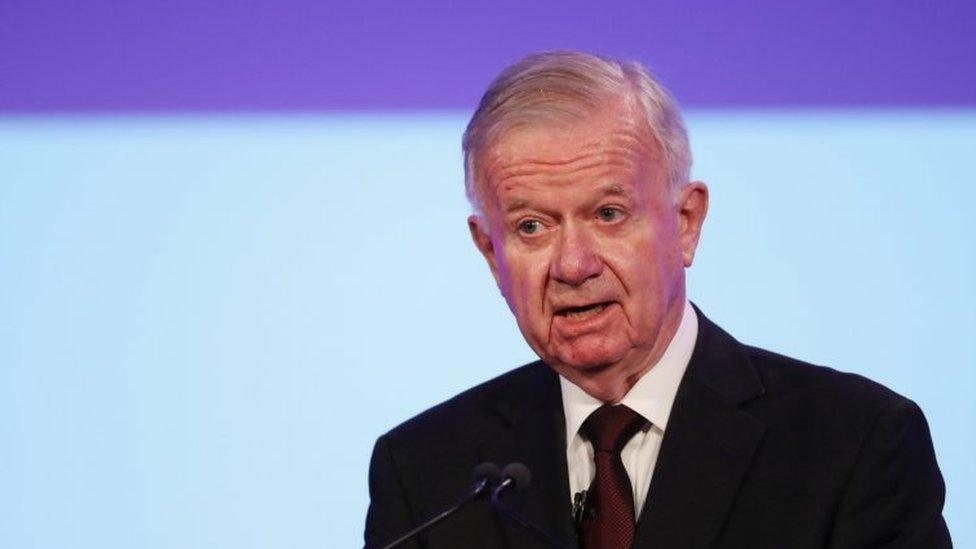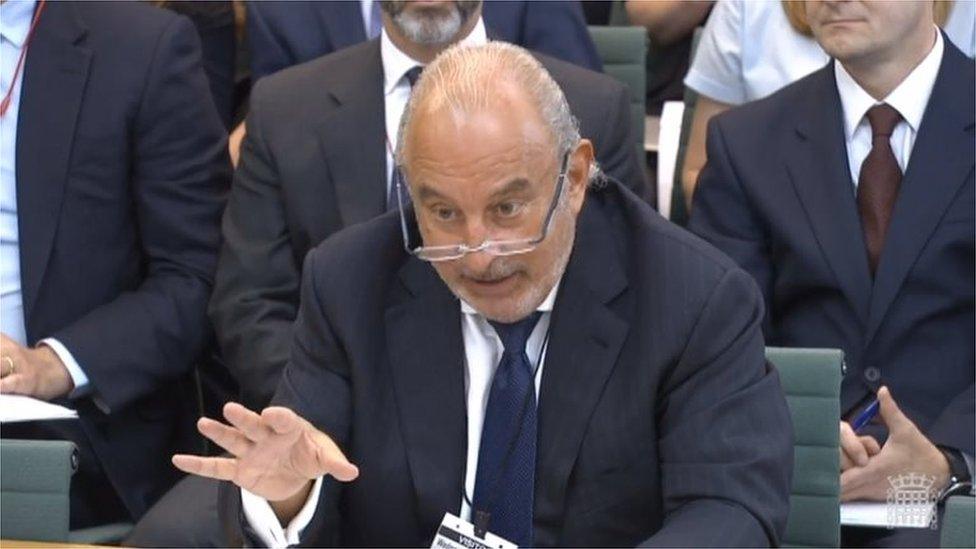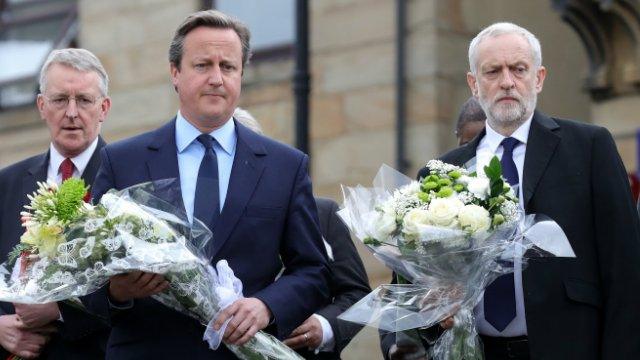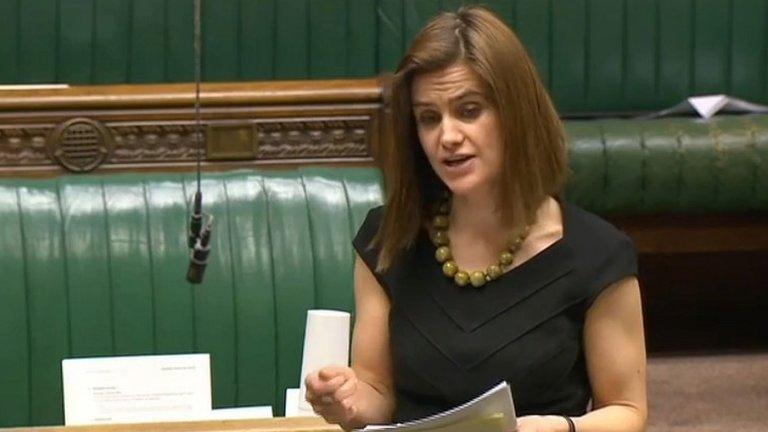Week ahead
- Published
- comments

With continuing chatter about a possible announcement about Heathrow Airport expansion, it's possible that a statement from the Transport Secretary Chris Grayling could provide the biggest parliamentary action of next week.
Otherwise it's a week of humdrum legislation, punctuated by some interesting-looking committee hearings - until we get to a crop of important private members' bills in both Lords and Commons, on the Friday.
Here's my rundown of next week's events:
Monday
The Commons opens (2.30pm) with Work and Pensions questions - and, as ever, any post weekend ministerial statements or urgent questions will usually be taken immediately after, at 3.30pm.
The day's main legislating is on the Savings (Government Contributions) Bill, external - this is the second reading debate on a bill to create new lifetime ISAs. These would be open to anyone under the age of 40, allowing them to save up to £4,000 a year. And for every £4 they put in the ISA, the government add a further £1. So put in £4,000 and the government will give £1,000, every year, until 50. Ministers believe it will be more flexible than the pension saving system and will be particularly helpful to the self-employed.
In Westminster Hall (4.30pm - 7.30pm) the Petitions Committee has scheduled a debate on a job lot of E-petitions on the UK's exit from the EU: petition 133618, external says "the British people have spoken. We have voted to leave the EU. We want article 50 of the Lisbon treaty to be invoked immediately. We still have two years to discuss our exit from the EU, but we do not wish to delay it any further"; petition 125333, external calls upon MPs to repeal the 1972 European Communities Act immediately should the EU referendum result in a Leave majority vote, thus making membership of the EU null and void, without any further interference from the government or the EU; petition 123324, external says that June 23 should be designated as Independence Day, and celebrated annually; petition 154593, external calls on the government not to allow freedom of movement as part of any deal with the EU after Brexit, arguing that the vast majority of those who voted leave did so because of the lack of control over immigration and free movement within Europe putting a strain on UK resources; petition 133767, external asks the government not to invoke article 50 of the Lisbon Treaty, arguing that Parliament is sovereign and the government is not legally obliged to invoke the Lisbon Treaty to start an EU exit, and similarly petition 133540, external says Parliament decide should whether or not we remain a member of the European Union. This will, of course be non-binding debate on one-vote-able motions.
Committee of the day is the Culture, Media and Sport session on the governance of football, with FA Chairman Greg Clarke and Director of Strategy and Robert Sullivan, (11am).
In the Lords (from 2.30pm) peers get into the meat of the Investigatory Powers Bill, external - report stage (day two of three) - key issues include Internet Connection Records, filtering arrangements, and oversight arrangements. The amendments come from two main sources - the government, in the shape of Earl Howe, often to put into action compromises brokered with Labour, when the bill was in the Commons, for example adding protections for "journalistic material", or from the Lib Dem team of Lord Paddick and Baroness Hamwee. The latter are mostly aimed at creating extra safeguards.
My eye was also caught by a series of amendments from the former Cabinet Secretary, Lord Butler plus Lord Janvrin and the Marquess of Lothian (the senior Conservative Michael Ancram), which would create new offences of breaching safeguards relating to examination of material under bulk interception warrants, breaching safeguards relating to examination of material, and of breaching safeguards relating to examination of data.
There will also be a short debate on tackling the rate of premature deaths among people with a learning disability led by the Crossbencher Baroness Hollins, who is a professor of the psychiatry of learning disability at St George's, University of London.
Tuesday
The Commons opens (11.30am) with Foreign and Commonwealth questions, followed by a Ten Minute Rule Bill from the Conservative Bill Wiggin on National Health Service Staff (Reporting and Registration), which would allow the central reporting and recording of absence from work of permanent NHS employees.
The day's main debate is on the renewal of the BBC Charter, on a government motion asking MPs to approve the draft agreement between the culture secretary the BBC.
And the adjournment debate is on the humanitarian situation in Yemen - led by Aden-born MP. Keith Vaz
In Westminster Hall (9.30am -11am ) the Labour former minister Fiona Mactaggart leads a debate on the performance of Concentrix, the US company dealing with tax credit claimants - their contract was aimed at saving the government more than £1bn in incorrect or fraudulent tax credit payments - but hundreds of people have complained they have been incorrectly penalised, and the government has said it will not be renewed.
At 11am the Conservative, John Baron has a debate on earlier cancer diagnosis and NHS finances - the All Party Parliamentary Group on Cancer have campaigned for NHS Clinical Commissioning Groups to be held accountable for their one year survival rates (ie from diagnosis) as a means of encouraging earlier diagnosis - the NHS still lags international averages by some measure.
But there is also a financial incentive because, for example, treating colon cancer at stage 1 costs around £3,000 per patient per year, whereas treatment at stage 4 costs £12,000. Mr Baron says the NHS has been poor at quantifying this and the debate is part of the APPG campaign to change this.
Committee of the day was going to be Sir John Chilcot at the Liaison Committee on follow-up to the Chilcot Report...but that has now been postponed until November.

Sir John was due to be questioned by MPs...but the hearing has been delayed.
Meanwhile, the Home Affairs hearing (11am) on the work of the Independent Inquiry into Child Sexual Abuse, with its (latest) Chair, Professor Alexis Jay, will have plenty to talk about.
In the Lords (2.30pm) it's the first report stage day on the Children and Social Work Bill,, external which aims to improve the opportunities and outcomes for children in the care of the state. The debate will focus on clauses dealing with corporate parenting principles and children leaving care. Watch out for an important concession by the government, to head off a cross party amendment from the crossbench peer, Lord Ramsbotham, to the outsourcing of social work with vulnerable children to prevent profit-making organisations.
There will also be a short debate on the potential effect on peace and stability in Europe and around the world of the United Kingdom leaving the European Union.
Wednesday
The Commons begins (11.30am) with a half an hour of Welsh questions, followed at noon by Prime Minister's Question Time. The day's ten minute rule bill comes from Labour's Kevan Jones who wants to impose rules for the training, qualifications and certification of cosmetic surgery practitioners and establish a code of practice for informing patients on the options and risks of particular procedures.
Then the main debate will be on an SNP Opposition day motion, to be announced.
In Westminster Hall, the Conservative Mark Field leads a debate on alms houses and their role in housing policy (9.30am -11am) marking the debut of a new All Party Group. He aims to highlight their role in social housing sector but also the specific legislative problems they're experiencing related to planning rules, the Welfare Reform Act, the Equality Act and the Housing Bill , that do not take account of their special status.
In the afternoon (2.30pm-4pm) Labour's Stephen Twigg will lead a debate on education in Merseyside, followed (4.30pm -5.30pm) by a debate on the effect of the UK leaving the EU on agriculture and fishing in the South West - led by the Conservative, Scott Mann.
Committee of the day is the Defence Sub-Committee hearing on MoD support for former and serving personnel subject to judicial processes - the witnesses include: Sir David Calvert-Smith, a former High Court judge, and Director of Public Prosecutions, and Jeremy Wright, the Attorney General.
In the Lords (from 3pm) it's the final day of report stage consideration of the Investigatory Powers Bill, external - which will deal with the most controversial aspect, the bulk data surveillance powers. The Lib Dem peers are still kicking off about this issue, but Labour is expected to abstain. The debate will also cover the David Anderson report recommendations and there will be a vote on the commencement clause on the costs for hacking amendment on which the government was defeated in the previous report stage day.
There will also be a short debate on the progress the Fit for Work scheme has made in enabling those with long-term health problems like chronic pain to return to or stay in work.
Thursday
The Commons meets at 9.30 am for Questions to the new Department for Exiting the European Union, prop David Davis. That is followed by the weekly Business Statement, from the Leader of the House

Sir Philip gave evidence to the joint committees in June
Then MPs turn to two debates on subjects chosen by the Backbench Business Committee. The first is on BHS: this is a joint bid by the Work and Pensions Committee Chair, Frank Field, and the BIS Chair, Iain Wright - which was requested to allow, as Mr Field put it, Parliament to vent its anger at the closure of the BHS chain, and about the failure to reach a settlement with its pensioners.
In particular, the backers of the debate wanted to focus on the conduct of the former BHS boss Sir Philip Green. Sir Philip, whose retail empire includes Top Shop, Top Man, Burton and Dorothy Perkins, was granted an honour just over a decade ago, in June 2006.
It was given "for services to retail", but his reputation as a retailer has been severely damaged over the past year. An amendment, tabled by the Conservative MP Richard Fuller and independent MP Michelle Thomson, calls for him to be stripped of his knighthood. MPs cannot themselves annul knighthoods, and it will be up to the Speaker whether or not to call the amendment to be debated. Even if there is a vote, it will not be binding but it is a way to register displeasure.
Next comes a general debate on the newly-fashionable subject of industrial strategy, following Theresa May's decision to reshape the former BIS Department into a department for industrial strategy.
In Westminster Hall (1.30pm -3pm) there will be a debate on the Education Committee's reports on the mental health and well-being of looked-after children, and on social work reform, where the select committee is pressing for the creation of a professional body to boost and enforce standards. Then there's a debate on National Arthritis Week.
In the Lords (from 11am) there will be debates on subjects chosen by Lib Dem peers. Firstly, on the implications for foreign and security policy co-operation with European states following the referendum result for the UK's withdrawal from the EU; and secondly, on the future of environmental and climate change policy in the context of Brexit.
Friday
The 2016 crop of private members' bills hits the Commons (9.30am) with the first offering from the SNP's John Nicolson, the Sexual Offences (Pardons Etc.) Bill.
This aims to offer a pardon to men convicted of gay sex offences which would not be illegal now. It will also include a "Pardon Plus" provision to allow such convictions to be expunged from the record, if the person concerned so requests.
Mr Nicholson is hoping to have enough support to force his bill to a vote, if there is any attempt to talk it out at second reading - most of his SNP colleagues will attend the debate and plenty of MPs from other parties have promised to be there, too. But he will need 100 votes to stop any filibuster.
If that bill gets past its first hurdle, the next is the Conservative Edward Argar's Registration of Marriage Bill - which aims to update the system to allow the names of mothers as well as fathers of people getting married to be included on the certificate.
Further down the agenda lurks the Labour MP Geraint Davies' Terms of Withdrawal from EU (Referendum) Bill, and Tom Brake's EU Citizens Resident in the United Kingdom (Right To Stay) Bill.
But it is highly unlikely that there will be time for much debate on those.
It's also private members' bill day in the Lords (from 10am) with some substantial legislation on offer; first up is the second reading of the Conservative, Lord Elton's House of Lords Bill, which aims to reduce the number of peers in the House of Lords in line with then number MPs...he would create a kind of "balloon debate" mechanism by which each party group would vote on who was to stay. Various incarnations of this idea have been floating around for a while.
Next will come the second reading of the Abortion (Disability Equality) Bill, proposed by the Conservative peer, Lord Shinkwin. He wants to remove the provision of the 1967 Abortion Act, which made abortion legal at any stage, where two doctors agreed "that there is a substantial risk that if the child were born it would suffer from such physical or mental abnormalities as to be seriously handicapped".
Last year, 3,213 abortions took place under the disability clause in England and Wales. Congenital malformations accounted for 1,450 of these; 689 were because of Down's syndrome.
The third bill is the Baroness Tonge's Marriage and Civil Partnership (Minimum Age) Bill which would raise the minimum age of consent to marriage or civil partnership to 18 and create an offence of causing a person under the age of 18 to enter into a marriage or civil partnership.
- Published17 June 2016

- Published17 June 2016
